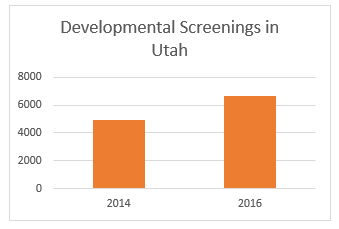In the last several years, Utah has engaged in a coordinated, statewide effort to increase developmental screenings for children ages 0-5. Developmental screenings allow health care providers to assess a child's health and development. Through periodic, age-appropriate developmental screenings, providers can tell if a child is on track developmentally or if there are delays. The earlier a delay is identified, the earlier a child can be treated, and the more likely providers can intervene and prevent a delay from escalating.
Utah is at the forefront of efforts nationwide to increase developmental screenings. Through coordinated efforts at the Utah Department of Health, as well as partners at the United Way, Help Me Grow Utah and state Baby Watch Early Intervention (EI) offices, among others, Utah has seen a significant increase in the number of children getting their age- appropriate developmental screenings.
In Utah, the number of completed developmental screenings has increased by almost 40% in the last two years.
Current federal proposals to cap or block grant Medicaid are directly at odds with efforts here in Utah to expand kids’ access to developmental screening, well-child visits and early intervention. As more children from all income brackets receive their age-appropriate developmental screenings, we can expect to see more children, including children on Medicaid, needing appropriate follow- up early intervention and treatment. If Utah receives a Medicaid block grant or per enrollee amount, this fixed allocation will not support Utah’s efforts to expand statewide developmental screenings.
These are critical investments we should be making in our children. Screening children in early childhood saves families, our health system and our state money in the future. Caps or cuts to Medicaid could lead to thousands of low-income children unable to get the care and treatment they need, following their screening. This is particularly critical because low income children, many of whom are on Medicaid, are twice as likely to experience developmental delays as their higher-income peers. Poverty -associated trauma and toxic stress can exacerbate developmental delays and compromise social- emotional health.[1]
In addition, federal proposals to cap or cut Medicaid could affect Utah’s developmental screening initiative in several others detrimental ways:
- A block grant or per capita cap proposal threatens Medicaid’s Early Periodic Screening, Diagnosis and Treatment (EPSDT) benefit. The EPSDT benefit ensures that a Medicaid-enrolled child who is identified as having a developmental delay is covered to receive the appropriate treatment and therapies, as determined by his or her provider. Changes at the federal and state level threaten to replace the EPSDT benefit with a more restricted benefit package, which could limit the treatment and care children in Medicaid can receive.
- Finally, a block grant or cap also threatens Baby Watch Early Intervention Services (EI). Early Intervention is a critical link in the system of care for children with special health care needs. Many children who are identified as having a delay during a developmental screening will be referred to Early Intervention for follow-up care. A cap or cut to Medicaid puts the Early Intervention program at risk.
In Utah, we value strong and thriving families. Our state and community leaders should be lauded for improving developmental screening rates and increasing access to early care and intervention services. Instead, their progress could be reversed through Medicaid block grants or per capita caps.
________________________________________
[1]School Readiness Matters: The Campaign for Grade Level Reading: http://gradelevelreading.net/wp-content/uploads/2014/06/School-Readiness-Matters-Research-Confirms-and-Citations-r2_KC.pdf
U.S. Department of Health and Human Services. (2014). Birth to Five: Watch Me Thrive. Washington DC: Administration for Children and Families. http://www.acf.hhs.gov/programs/ecd/watch-me-thrive
Center on the Developing Child. (2014). Key Concepts: Toxic Stress. Cambridge, MA: Harvard University. http://developingchild.harvard.edu/key_concepts/toxic_stress_response/






